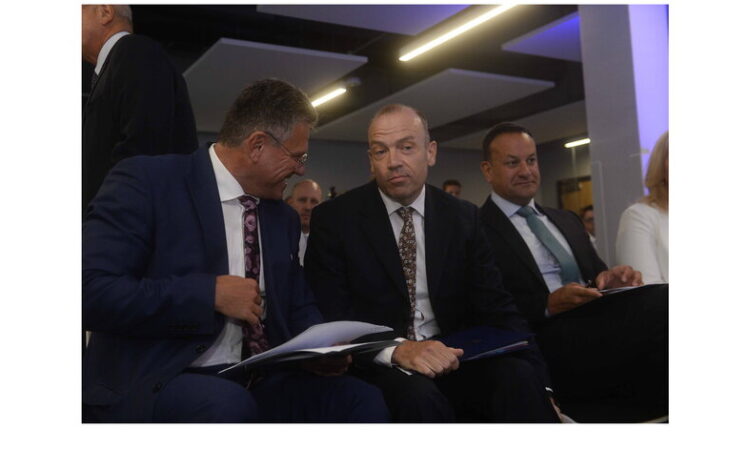
John Manley Political Correspondent
11 September, 2023 18:24
It’s deeply ironic that an event launching cross-border peace-building funds further fuelled a deterioration in relations between the Irish and British governments. PEACEPLUS takes over where its EU-funded predecessors left off after Brexit. Since the Good Friday Agreement, the PEACE funds have been used across a variety of sectors to foster prosperity and reconciliation. The UK’s departure from the EU put the funds in doubt but the British government has stepped up, with assistance from Dublin and Brussels, to ensure the momentum built over the past quarter century is maintained. Around three-quarters of the money – £730 million – comes from the UK exchequer, with the EU and the Irish government making up the remainder of the £978m that targets Northern Ireland and the Republic’s border counties.
Historically, the Special EU Programme Body (SEUPB) has been responsible for overseeing the fund, and despite a greater proportion of the money now coming from London, it remains in place to distribute the latest tranche, which extends to 2027. To some degree that explains the prominent EU branding and the equal billing given to the fund’s minority contributors but observers at the launch event couldn’t help feel the Northern Ireland Office (NIO) wasn’t milking the British government’s largesse as much as they could or should have.
Most will concede that previously an announcement on PEACE fund wouldn’t have attracted a great deal of media attention but the presence of European Commission executive vice-president Maros Sefcovic, Taoiseach Leo Varadkar and Secretary of State Chris Heaton-Harris ensured a sizeable press pack at the Newforge Community Development Hub in south Belfast. The launch itself was rather uneventful. A series of underwhelming speeches from the above dignitaries were punctuated by music and highland dancing, alongside videos highlighting the PEACE fund ‘s previous successes. It was all a bit toe-curling and self-congratulatory but nothing out of the ordinary.
The tone was markedly different during the press conferences that followed, however, firstly with Mr Varadkar stressing how “alternative arrangements” will need to be discussed if the suspension of the institutions carries on much longer. Mr Heaton-Harris’s people were already a little disgruntled over the taoiseach saying last month about the need for “conversations about alternatives – about plan B” if the DUP’s Stormont boycott persists.
Read more: Irish premier stands by ‘unity in my lifetime’ comment
Dublin comments ‘unhelpful’ amid efforts to restore Stormont – Heaton-Harris
The Fine Gael leader apparently added further fuel to the fire last Friday, when he restated his view that there would be a united Ireland in his lifetime.
Then on Sunday, the taoiseach’s office sent out notification to journalists saying that Mr Varadkar would be in Belfast on Monday to “announce €1.14 billion in funding”. Ordinarily, this wouldn’t be a big deal but press lines for the PEACEPLUS launch had already been agreed and issued under embargo by a Belfast-based PR company on Friday. However, the email from Dublin, which accordingly gave prominence to the role of the Irish government, was embargoed until midnight – a full 12 hours ahead of when NIO-approved press release could be published.
The coverage on Monday morning which relied heavily on the lines from Dublin justifiably irked NIO officials, somewhat souring the atmosphere around the launch of the peace funds.
In the press conference that followed the launch the taoiseach defended of his united Ireland comments, as well as urging the British government to “pause” it legacy legislation and reiterating his belief that a new approach was required if Stormont remains dormant. Mr Heaton-Harris emerged immediately afterwards to accuse Mr Varadkar of making “unhelpful comments” that “resonate up here amongst the unionist community”.
While not quite a major diplomatic incident, it was clear there was a tetchiness between the two that extended to their respective entourages – not a good look when you’re talking about peace-building. Contrastingly, relations between the secretary of state and Maros Sefcovic are said to be “very warm”, with the two men travelling on to a later engagement together.
A year ago, during Liz Truss’s brief stint in Downing Street, Anglo-Irish relations reached a nadir, but improved immeasurably over the subsequent months as Rishi Sunak took a a more pragmatic line to resolving the difficulties around the protocol. But these diplomatic advances could easily be undone if there is a failure by the NIO to recognise Dublin has a right, and a responsibility to voice legitimate concerns, and likewise, Irish officials should perhaps recognise their British counterparts’ disquiet at the press release shenanigans.






